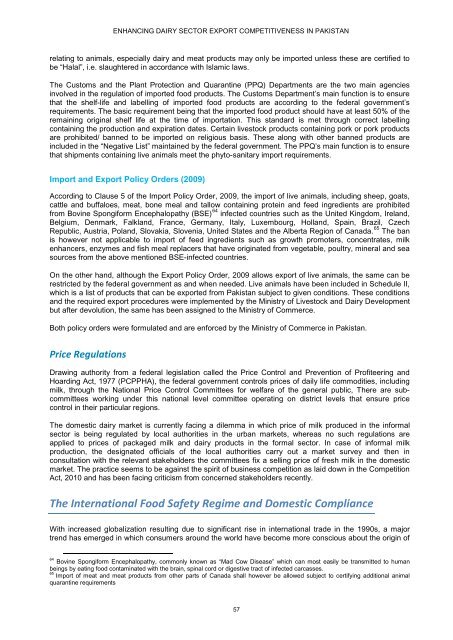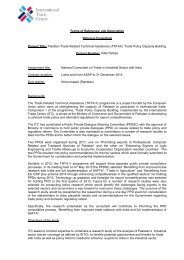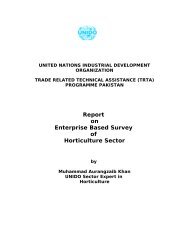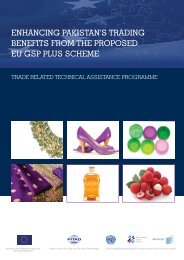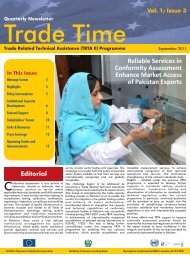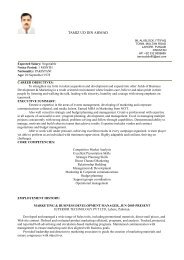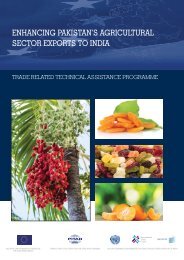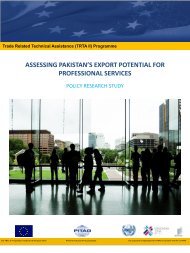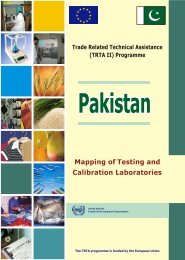Enhancing dairy sector export competitiveness - International Trade ...
Enhancing dairy sector export competitiveness - International Trade ...
Enhancing dairy sector export competitiveness - International Trade ...
You also want an ePaper? Increase the reach of your titles
YUMPU automatically turns print PDFs into web optimized ePapers that Google loves.
ENHANCING DAIRY SECTOR EXPORT COMPETITIVENESS IN PAKISTANrelating to animals, especially <strong>dairy</strong> and meat products may only be imported unless these are certified tobe “Halal”, i.e. slaughtered in accordance with Islamic laws.The Customs and the Plant Protection and Quarantine (PPQ) Departments are the two main agenciesinvolved in the regulation of imported food products. The Customs Department’s main function is to ensurethat the shelf-life and labelling of imported food products are according to the federal government’srequirements. The basic requirement being that the imported food product should have at least 50% of theremaining original shelf life at the time of importation. This standard is met through correct labellingcontaining the production and expiration dates. Certain livestock products containing pork or pork productsare prohibited/ banned to be imported on religious basis. These along with other banned products areincluded in the “Negative List” maintained by the federal government. The PPQ’s main function is to ensurethat shipments containing live animals meet the phyto-sanitary import requirements.Import and Export Policy Orders (2009)According to Clause 5 of the Import Policy Order, 2009, the import of live animals, including sheep, goats,cattle and buffaloes, meat, bone meal and tallow containing protein and feed ingredients are prohibitedfrom Bovine Spongiform Encephalopathy (BSE) 64 infected countries such as the United Kingdom, Ireland,Belgium, Denmark, Falkland, France, Germany, Italy, Luxembourg, Holland, Spain, Brazil, CzechRepublic, Austria, Poland, Slovakia, Slovenia, United States and the Alberta Region of Canada. 65 The banis however not applicable to import of feed ingredients such as growth promoters, concentrates, milkenhancers, enzymes and fish meal replacers that have originated from vegetable, poultry, mineral and seasources from the above mentioned BSE-infected countries.On the other hand, although the Export Policy Order, 2009 allows <strong>export</strong> of live animals, the same can berestricted by the federal government as and when needed. Live animals have been included in Schedule II,which is a list of products that can be <strong>export</strong>ed from Pakistan subject to given conditions. These conditionsand the required <strong>export</strong> procedures were implemented by the Ministry of Livestock and Dairy Developmentbut after devolution, the same has been assigned to the Ministry of Commerce.Both policy orders were formulated and are enforced by the Ministry of Commerce in Pakistan.Price RegulationsDrawing authority from a federal legislation called the Price Control and Prevention of Profiteering andHoarding Act, 1977 (PCPPHA), the federal government controls prices of daily life commodities, includingmilk, through the National Price Control Committees for welfare of the general public, There are subcommitteesworking under this national level committee operating on district levels that ensure pricecontrol in their particular regions.The domestic <strong>dairy</strong> market is currently facing a dilemma in which price of milk produced in the informal<strong>sector</strong> is being regulated by local authorities in the urban markets, whereas no such regulations areapplied to prices of packaged milk and <strong>dairy</strong> products in the formal <strong>sector</strong>. In case of informal milkproduction, the designated officials of the local authorities carry out a market survey and then inconsultation with the relevant stakeholders the committees fix a selling price of fresh milk in the domesticmarket. The practice seems to be against the spirit of business competition as laid down in the CompetitionAct, 2010 and has been facing criticism from concerned stakeholders recently.The <strong>International</strong> Food Safety Regime and Domestic ComplianceWith increased globalization resulting due to significant rise in international trade in the 1990s, a majortrend has emerged in which consumers around the world have become more conscious about the origin of64 Bovine Spongiform Encephalopathy, commonly known as “Mad Cow Disease” which can most easily be transmitted to humanbeings by eating food contaminated with the brain, spinal cord or digestive tract of infected carcasses.65Import of meat and meat products from other parts of Canada shall however be allowed subject to certifying additional animalquarantine requirements57


